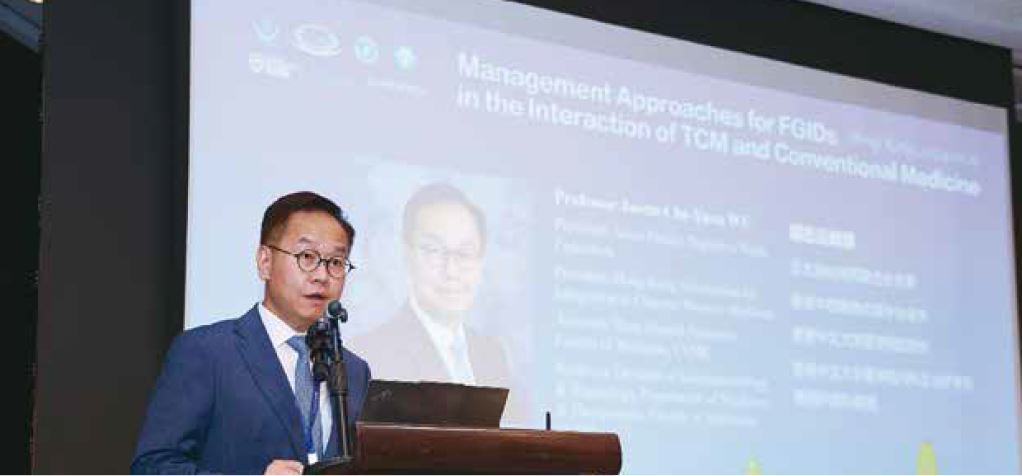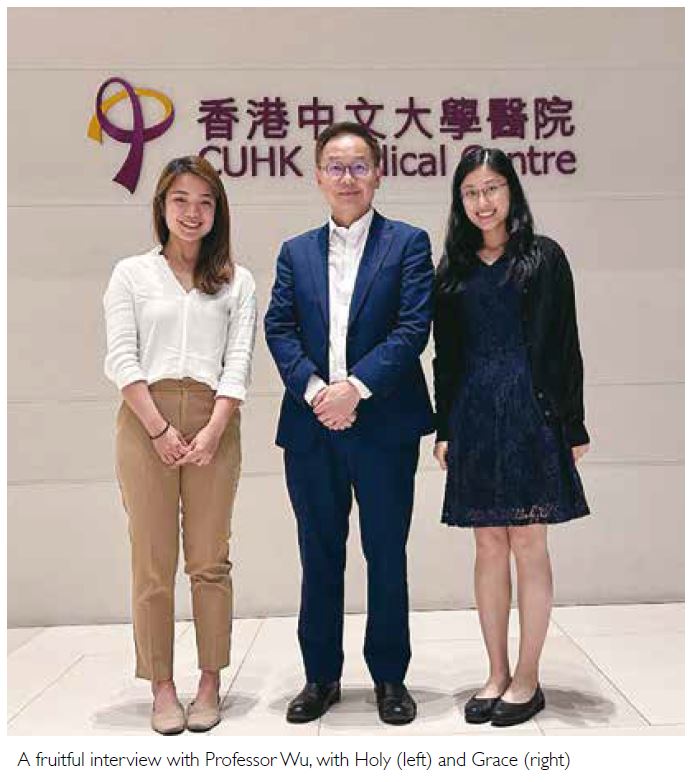© Hong Kong Academy of Medicine. CC BY-NC-ND 4.0
HEALTHCARE FOR SOCIETY
Vision and leadership in advancing healthcare: a conversation with Professor Justin Wu
Grace Lam1, Holy Chan2
1 MB, ChB, Faculty of Medicine, The Chinese University of Hong Kong, Hong Kong SAR, China
2 MB, BS, Department of Orthopaedics and Traumatology, Tseung Kwan O Hospital, Hong Kong SAR, China
Hong Kong’s healthcare system stands at a critical
juncture as it witnesses the burgeoning of the
Greater Bay Area. The city’s unique position as an
international medical hub with deep connections
to mainland China presents both challenges and
opportunities for healthcare advancement. Professor
Justin Wu’s distinguished career exemplifies the
type of visionary leadership needed to navigate this
complex landscape, demonstrating how Hong Kong
can leverage its strengths while embracing regional
collaboration.
Professor Wu’s journey illustrates the evolving
nature of healthcare leadership in Hong Kong.
After obtaining his medical degree from The
Chinese University of Hong Kong (CUHK) and
completing specialty training at Prince of Wales
Hospital, Professor Wu’s early academic career took
unexpected turns that would later prove pivotal
in cultivating his comprehensive worldview. His
research ventures into diverse realms of functional
gastrointestinal disorders and traditional Chinese
medicine—which initially seemed to be detours—proved valuable in his dedication to the development
of integrative healthcare. These experiences laid the
foundation for his later establishment of the Hong
Kong Institute of Integrative Medicine in 2013, which
sought to bridge Chinese and Western medicine.
During his teaching years at CUHK from
2007 to 2012, Professor Wu recognised the growing
importance of technology in medical education.
Despite initially facing considerable scepticism
within the field, he pioneered the Global Physician Stream programme to incorporate technological
competencies into young physician training. This
initiative highlighted his willingness to advocate
innovative ideas even when they challenged
conventional wisdom. His subsequent leadership
roles, ranging from Director of CUHK Medical
Centre to involvement in venture capital and non-governmental
organisation boards, demonstrated his
commitment to viewing healthcare as an interwoven
ecosystem rather than isolated institutions.
The development of the Greater Bay Area
presents unprecedented opportunities for Hong
Kong’s healthcare sector. As a management consultant,
Professor Wu has substantially contributed to
international healthcare collaborations in the
rapidly developing Qianhai area, helping to shape
this special economic zone’s medical landscape.
Notably, Prince Bay is emerging as Shenzhen’s new
Central Business District, strategically located just
30 minutes from Hong Kong’s New Territories West.
This area has the potential to become an extension of
Hong Kong’s private healthcare sector and a testing
ground for integrating medical technologies from
both sides of the border.
Hong Kong’s healthcare system possesses
distinct advantages that complement mainland
China’s strengths. The city’s rigorous clinical training
produces highly skilled specialists, and its hybrid
healthcare model successfully combines universal
coverage with private sector efficiency. Furthermore,
mainland China excels in rapidly integrating research
innovations into clinical practice, particularly in areas such as artificial intelligence–driven diagnostics and
large-scale clinical trials. The cost-effectiveness of
advanced medical treatments in mainland China,
such as cell and gene therapy offered at a fraction
of Western prices, presents additional opportunities
for collaboration.
Professor Wu’s leadership approach offers
valuable lessons for Hong Kong’s medical community.
His ability to connect diverse stakeholders—from
clinicians to engineers to policymakers—mirrors
Hong Kong’s historical role as a bridge between East
and West. The paradigm of professional empathy
that he champions transcends conventional didactic
medical education, promoting interdisciplinary
perspective taking as a catalyst for substantive
innovation. This skill is gaining importance as
healthcare becomes more multidimensional and
as Hong Kong medical professionals engage with
counterparts in the region and beyond.
Professor Wu’s career demonstrates how
visionary leadership, coupled with practical
collaboration, can translate the potential for
integrated, innovative healthcare into reality. The
challenge for Hong Kong’s medical community
comprises embracing this opportunity while
maintaining the city’s renowned standards of
excellence, thereby ensuring that healthcare integration benefits patients throughout the region.



